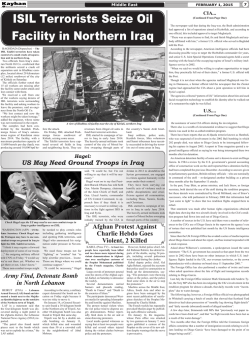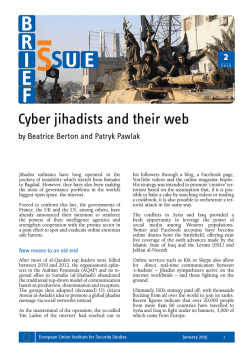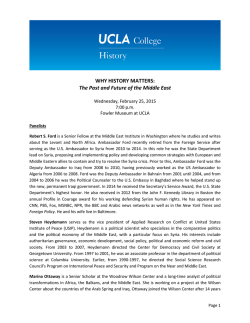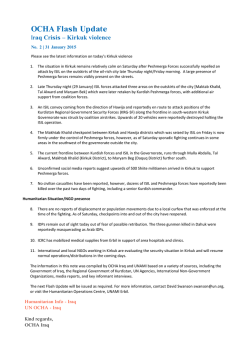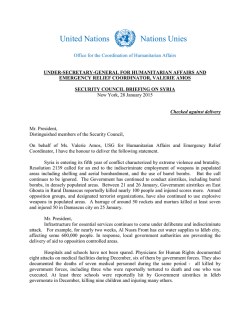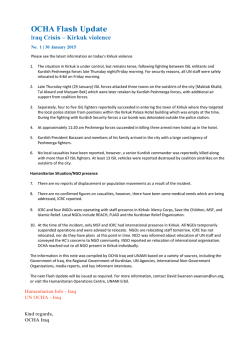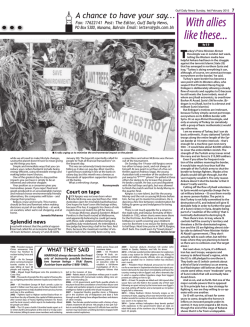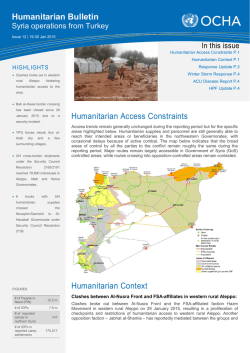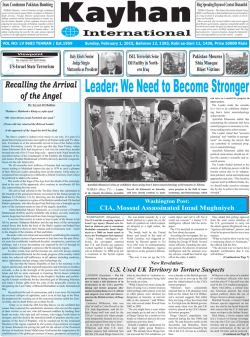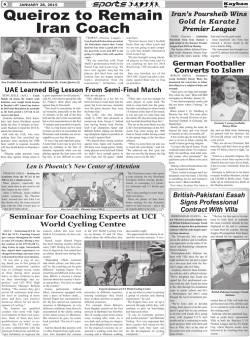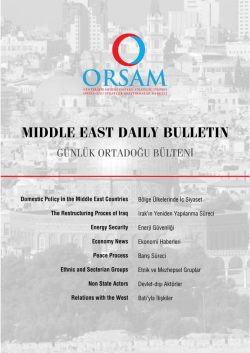
Pdf Version
Middle East Hezbollah, Future Vow to Support Army Against Terrorists BEIRUT (Press TV) - The two main Lebanese rival parties have vowed to take “practical steps” to support the army in the face of terrorist groups operating in the country’s border areas with Syria. The support for security forces came during a Monday meeting between senior officials from Hezbollah resistance movement and the Future Movement at Speaker Nabih Berri’s residence in the Lebanese capital, Beirut. Referring to the ongoing fighting with terrorist groups such as ISIL and al-Nusra Front in the northeastern parts of the country, “The participants reaffirmed the firm stance in backing the army and security forces with all means to confront terrorism and protect Lebanon,” according to a statement issued after the meeting. Both parties also “appreciated the positive development of the dialogue and its subsequent impact on the public opinion.” “They have agreed on some practical steps that will boost the climate of stability” in the country, it added. The statement came days af- Hezbollah leader Seyyed Hassan Nasrallah (R) meets ex-PM Saad Hariri in Beirut (L) Speaker Nabih Berri (C) ter eight Lebanese soldiers were killed following fierce clashes with Syria-based Takfiri terrorists near the Syrian border. In a statement released on Sunday, the Lebanese army stated that 12 Syria-based suspects were detained for attempts to organize a terrorist cell following a raid by the Lebanese troops in the al- Marj district of the Bekaa Valley. The army said five others were also taken into custody over illegal entry into the Lebanese territory. Over the past months, Lebanon has been suffering from terrorist attacks by the Takfiri terrorists and random rocket attacks, viewed as a spillover of the con- flict in Syria. Takfiri groups, with members from several Western countries, control parts of Syria and Iraq, and have been carrying out horrific acts of violence such as public decapitations and crucifixions against all communities such as Shias, Sunnis, Kurds, and Christians. To Discuss ISIL Fight in al-Hasakah Syrian Commander Meets With Tribal Leaders DAMASCUS (Press TV) – A Syrian military commander has met with local tribal leaders in northeastern Syria to discuss cooperation in the battle against foreign-backed Takfiri terrorists, Press TV reports. The meeting was held in the city of al-Hasakah, the capital of a province with the same name. During the meeting, the two sides reviewed the prospects of recruiting more troops to fight the Takfiri ISIL terrorists. Last week, the terrorists executed dozens of civilians in the province. Local sources, speaking on condition of anonymity, said the ISIL terrorists overran the villages of Tal Maghas as well as Um Raqabah on January 22, and fatally shot dozens of people. The Takfiris later de- ‘Iraq Obtains Intelligence on ISIL From Ex-Troops in Mosul’ BAGHDAD (AP) – A senior Iraqi MP says “sleeper cells” made up of the nation’s former military and police officers are tipping off Iraqi authorities to positions of ISIL Takfiri terrorists in the northern city of Mosul. “Those patriotic groups, some operate from inside the city of Mosul and others from the areas surrounding it, are now giving us information about the military preparations being made by ISIL in order to face any attack by government forces to retake the city,” said the head of Iraqi parliamentary committee on security and defense, Hakim al-Zamili, cited in an AP report on Monday. According to the report, the remarks reflect the first high-level confirmation of the groups’ existence following weeks of rumors about such informants. “We receive a lot of useful information from Mosulis who are becoming fed up with the mili- tants and this is the reason why the ISIL blocked all mobile phone networks in the city,” Zamili added. According to the Iraqi lawmaker, their information then gets passed to Iraqi military commanders in charge of airstrikes and military operations in Ninevah province. Their work, however, remains extremely risky as the ISIL Takfiri terrorists have shut down mobile phone networks and execute suspected government collaborators on a regular basis. The Takfiri terrorists captured Mosul in August when they led an offensive across northern Iraq. At the time many Iraqi troops and police officers dropped their weapons and fled the scene during the terror group’s initial offensive, said the Iraqi MP. He added, however, that now some of the ex-officers have begun spying on behalf of the Iraqi government. stroyed the victims’ houses, according to Syria’s official news agency, SANA. ISIL Takfiris executed eleven civilians and mutilated their bodies in Syria’s eastern province of Deir ez-Zor on January 15. The ISIL controls parts of Syria and Iraq, and has been carrying out horrific acts of violence such as public decapitations and crucifixions against all communities, including Shias, Sunnis, Kurds, and Christians. Over 200,000 people have been killed in the crisis in Syria since 2011, when the foreignbacked militancy began in the Arab country. New figures show that over 76,000 people, including thousands of children, lost their lives in Syria last year alone. Zionist Military Dismisses 43 Troops for Criticizing Regime WEST BANK (Dispatches) – The Zionist regime’s military has dismissed over 40 soldiers for publicly criticizing the Tel Aviv regime’s crimes against Palestinians. The 43 male and female reserve troops, who were members of the Zionist army’s spying unit, were fired on Monday after they refused to “continue serving the system which affects the rights of millions of people.” In a letter published by Israeli media in September 2014, the troops wrote to Prime Minister Benjamin Netanyahu and top army chiefs that they could no longer serve in the unit because they didn’t want to participate in the injustices committed against Palestinians. The signatories also criticized the “political persecution” their spying activities involved. The letter was reportedly written a few weeks after the regime’s 50-day offensive on the Gaza Strip last summer. The occupying regime started its latest war on Gaza in early July 2014. Over 2,100 people died and some 11,000 others were injured in the war, which ended on August 26 with a truce that took effect after indirect negotiations in the Egyptian capital, Cairo. More than 15,500 housing units were also damaged in the attacks while over 2,200 houses were totally destroyed, according to official figures released by Palestinian sources. JANUARY 28, 2015 Zionists... (Continued From Page One) forced Israel’s hand by building an offensive infrastructure on its backyards. The Zionist regime stressed it did not want the situation to deteriorate into a regional conflict. “Russian leaders conveyed this message to Beirut and Tehran,” the Times of Israel reported. The Zionist regime’s war minister Moshe Ya’alon said Monday Iran was seeking to open a new front against Israel from the Syrian Golan Heights. Speaking a little more than a week after the assassinations, Ya’alon appeared to link the airstrike to Iran’s activities in Syria. Ya’alon made the remarks while visiting a missile and satellites plant in Yehud together with the occupying regime’s PM Benjamin Netanyahu. “It’s true regarding the need to prevent it (Iran) from attacking us, whether from Lebanon with Hezbollah or from Gaza, with Hamas and Islamic Jihad, or whether it’s what we saw last Sunday – an Iranian arm that is beginning to develop, to open a front against us on the Golan Heights,” he said. Monster... (Continued From Page One) OMX Group, and BATS Global Markets said they expected their exchanges to stay open for normal operating hours on Tuesday. The last time foul weather led to the closing of the stock markets was in October 2012 when Superstorm Sandy hit the East with flooding, punishing winds and widespread power outages. The latest storm posed a fresh challenge to New York City Mayor Bill de Blasio, under fire from police who criticized his support of public protests about white police violence against black men. De Blasio was vilified for keeping schools open in the last major storm. Vacationers and business travelers faced headaches as airlines canceled around 7,000 U.S. flights, with Boston and New York airports most heavily affected, according to flight-tracking service FlightAware. New York authorities said “virtually all” flights at LaGuardia Airport on Tuesday would be canceled and cancellations at John F. Kennedy International Airport would be “significant”. Amtrak suspended rail service on Tuesday between New York and Boston, and into New York state, Vermont, Massachusetts and Maine. The biggest snowfall on record in New York City came during the storm of Feb. 11-12, 2006, dropping 26.9 inches (68 cm), according to the city’s Office of Emergency Management. U.S. ... (Continued From Page One) potentially tagging people as criminals without due process,” the ACLU warned. The Wall Street Journal, citing official documents and anonymous officials, reported that the program built a national database to track vehicles in real time and stored hundreds of millions of records about motorists. The database’s expansion “throughout the United States”, as one DEA email put it, worried Senator Patrick Leahy, who sits on the Senate judiciary committee. “The fact that this intrusive technology is potentially being used to expand the reach of the government’s asset forfeiture efforts is of 7 even greater concern,’’ he told the Wall Street Journal. Leahy called for additional accountability and said Americans should not have to fear that “their locations and movements are constantly being tracked and stored in a massive government database”. According to the ACLU, the government-run national license plate tracking program dates from 2008. Information had trickled out over the years but far too little was known about the program, the ACLU said. ‘Surveillance a Threat to Human Rights’ Europe’s top rights body has said mass surveillance practices are a fundamental threat to human rights and violate the right to privacy enshrined in European law. The parliamentary assembly of the Council of Europe says in a report that it is “deeply concerned” by the “far-reaching, technologically advanced systems” used by the U.S. and UK to collect, store and analyze the data of private citizens. It describes the scale of spying by the U.S. National Security Agency, revealed by Edward Snowden, as “stunning”. The report also suggests that British laws that give the monitoring agency GCHQ wide-ranging powers are incompatible with the European convention on human rights. It argues that British surveillance may be at odds with article 8, the right to privacy, as well as article 10, which guarantees freedom of expression, and article 6, the right to a fair trial. There is compelling evidence that U.S. intelligence agencies and their allies are hoovering up data “on a massive scale”, the report says. U.S.-UK operations encompass “numerous persons against whom there is no ground for suspicion of any wrongdoing”, it adds. The assembly is made up of delegates from 47 member states, including European Union and former Soviet countries. It was due to debate the report’s recommendations on Tuesday. Several British surveillance cases are currently before the Strasbourg court. Amnesty International, the American Civil Liberties Union, Privacy International and Liberty all argue that GCHQ’s mass collection of data infringes European law. It says the assembly is deeply worried by the fact that intelligence agencies have deliberately weakened internet security by creating back doors and systematically exploiting weakness in security standards and implementation. Another concern is the use of “secret laws, secret courts and secret interpretations of such laws” to justify mass surveillance. Typically, these laws “are very poorly scrutinized”. The report says that Europe’s intelligence services work closely with their American counterparts. India... (Continued From Page 2) India used to settle part of its oil debt in rupees that Iran then used to buy other goods from India. But a deal between Iran and western powers in November 2013 that eased some of the trade sanctions broke India’s hold on soymeal sales to Iran. “Now since sanctions have eased, Iran is not ready to pay a premium over global prices,” said Jain. “It has been buying soymeal from South American countries at lower prices.” India exported 140,400 tons of soymeal to Iran over April to December last year, versus record shipments of 1.23 million tons in 2013/14.
© Copyright 2026
